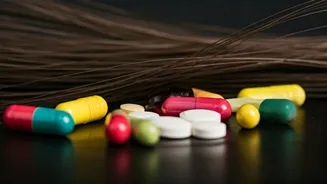Protein: Keratin's Power
Protein, specifically keratin, is a fundamental building block of hair. This fibrous structural protein constitutes the majority of your hair's composition.
Adequate protein intake is vital because hair is, in essence, a protein-based structure. When your body lacks protein, it may prioritize other essential functions, potentially leading to a decline in hair health and increased susceptibility to greying. Foods abundant in protein, such as eggs, lean meats, fish, and legumes, are essential for supporting keratin production and maintaining hair's natural pigment. Ensuring sufficient protein intake provides the necessary components for hair to maintain its strength, elasticity, and color, effectively counteracting the factors that contribute to premature greying. Consuming these food groups helps to provide a foundation for robust, well-pigmented hair by supporting the creation of keratin.
Vitamin B5's Role
Vitamin B5, also known as pantothenic acid, contributes to overall hair health and the preservation of its natural color. This vital vitamin is essential for metabolizing proteins, fats, and carbohydrates, all crucial for the growth and maintenance of healthy hair. B5 aids in the creation of red blood cells, which transport oxygen and nutrients to the hair follicles, providing a nourishing environment for hair pigment-producing cells. A deficiency in vitamin B5 can lead to several hair-related problems, including premature greying. B5 is involved in the synthesis of melanin, the pigment that gives hair its color. By ensuring you get enough B5, either through food like avocados, nuts, and eggs, or supplements, you're boosting the process of hair follicle nourishment and potentially supporting the maintenance of hair color. This is not a direct fix, but a very important factor.
Moringa for Hair Growth
Moringa, often referred to as the 'miracle tree,' is packed with nutrients that can significantly influence hair health and combat premature greying. Moringa leaves and their derivatives are rich in vitamins, minerals, and antioxidants, all essential for hair health. The presence of antioxidants in moringa helps to protect hair follicles from oxidative stress, a primary contributor to greying. The consumption of moringa powder or juice provides essential vitamins, especially those like Vitamin A, C, and E, that promote overall hair health. The nutrients in moringa support the production of melanin, which is vital for maintaining hair color. Integrating moringa into your diet can provide an added boost to your daily regimen and help fight the effects of premature greying.
Biotin: Hair's Best Friend
Biotin, or vitamin B7, plays a crucial part in maintaining the health and appearance of your hair. This essential water-soluble vitamin is a key component in keratin production, which is the basic protein of hair, skin, and nails. Biotin deficiency can manifest in various ways, including hair thinning, brittleness, and premature greying. By supporting keratin production, biotin strengthens hair strands and helps to maintain their pigment. Regular intake of biotin, either through dietary sources like eggs, nuts, and seeds, or via supplementation, provides the building blocks for healthy, vibrant hair. Consuming biotin can help the body create new hair cells and help reduce the appearance of grey hairs, and it is a good idea to incorporate into your hair-care routine.
Vitamin D: A Vital Nutrient
Vitamin D plays an essential role in numerous bodily functions, and its influence extends to hair health. Vitamin D supports the development of hair follicles and aids in the hair growth cycle. Research suggests a link between low vitamin D levels and premature greying. Sufficient vitamin D facilitates the absorption of calcium, which is vital for the overall health of hair follicles. Exposure to sunlight is a natural source of vitamin D, and including vitamin D-rich foods like fatty fish and fortified dairy products in your diet can support your hair's overall health and help to potentially reduce premature greying. Vitamin D can help support your hair's ability to maintain its natural pigment and can be essential for those seeking to maintain their natural hair color.












